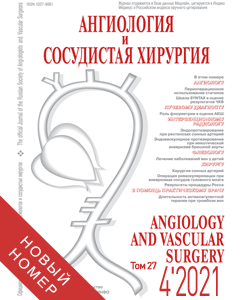Journal «Angiology and Vascular Surgery» •
2021 • VOLUME 27 • №4
Complications of permanent vascular access for haemodialysis
Maksimov A.V.1,2, Gaisina E.A.1, Feiskhanov A.K.1
1 Department of Vascular Surgery, Republican Clinical Hospital of the Ministry of Public Health of the Republic of Tatarstan,
2 Kazan State Medical Academy – Branch of the Russian Medical Academy of Continuous Professional Education under the RF Ministry of Public Health, Kazan, Russia
Permanent vascular access is the basis of renal replacement therapy by the method of programmed haemodialysis, on whose stable functioning depends the life of patients with end-stage renal disease.
At the present time, there is significant deficit of scientific and methodological Russian-language literature on this problem, with no Russian consensus documents concerned. This article is a review of the contemporary world literature dedicated to the problem of permanent vascular access, including currently in force European (2018) and North American (2019) guidelines for good clinical practice, also discussing the problems of strategy and tactics of creating a permanent vascular access, monitoring its dysfunction, pathophysiology of functioning of arteriovenous fistulas. Presented herein are unified approaches to diagnosis and treatment of thrombolytic and haemorrhagic complications associated with the access, as well as local infectious and non-infectious complications. Special attention is paid to indications for the operation and rational therapeutic decision-making.
KEY WORDS: permanent vascular access, renal replacement therapy, haemodialysis, arteriovenous fistula, chronic renal failure, complications
Р. 174
ARCHIVES MAGAZINE
2021 (Vol.27)
2020 (Vol.26)
2019 (Vol.25)
2018 (Vol.24)
2017 (Vol.23)
2016 (Vol.22)
2015 (Vol.21)
2014 (Vol.20)
2013 (Vol.19)
2012 (Vol.18)
2011 (Vol.17)
2010 (Vol.16)
2009 (Vol.15)
2008 (Vol.14)
2007 (Vol.13)
2006 (Vol.12)
2005 (Vol.11)
2004 (Vol.10)
2001 (Vol.7)
2000 (Vol.6)
1999 (Vol.5)
1998 (Vol.4)
1997 (Vol.3)


